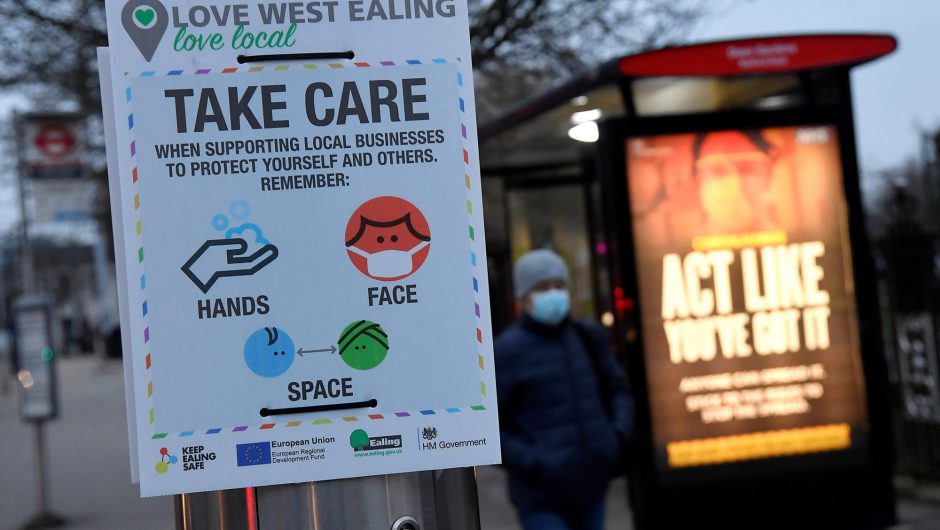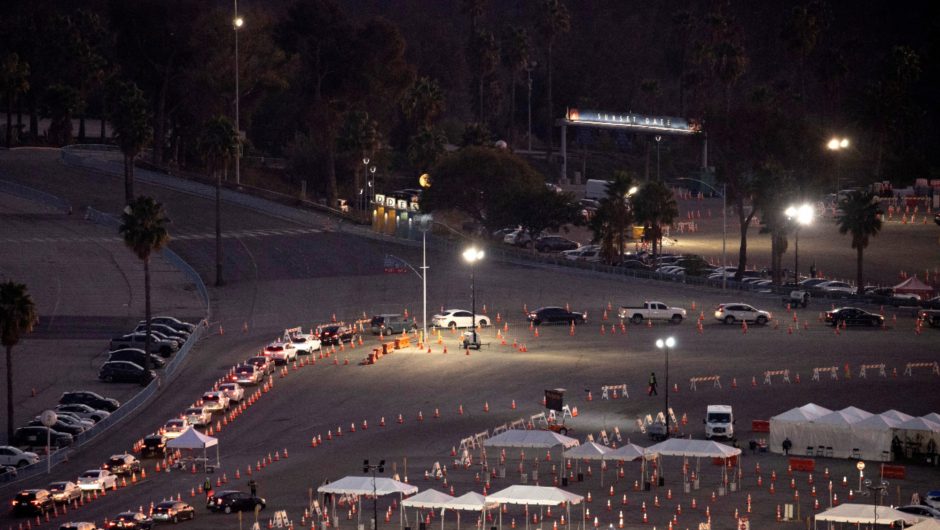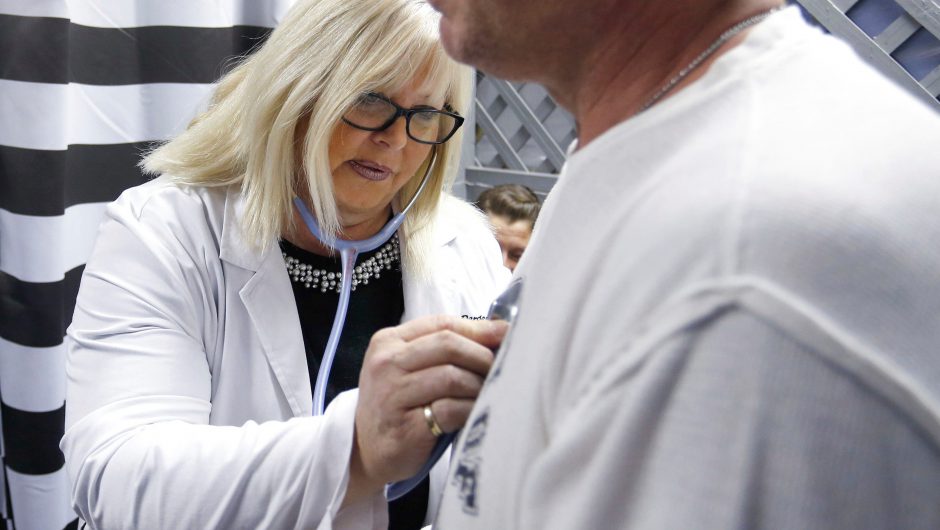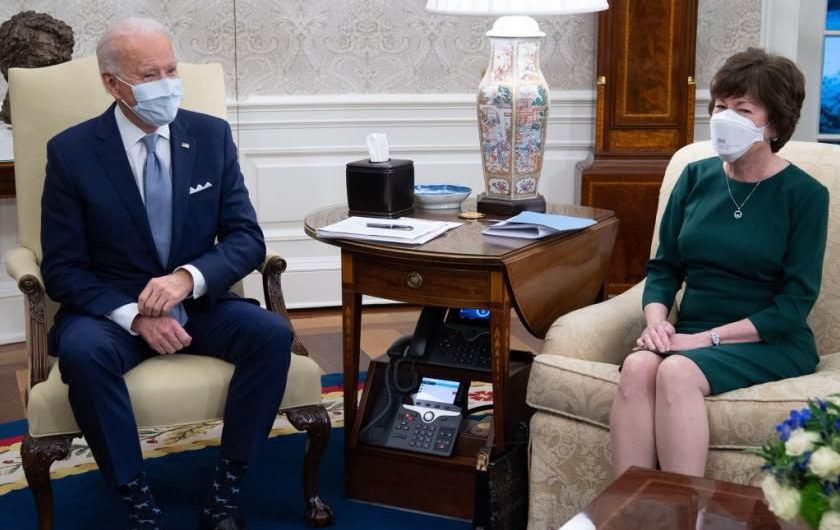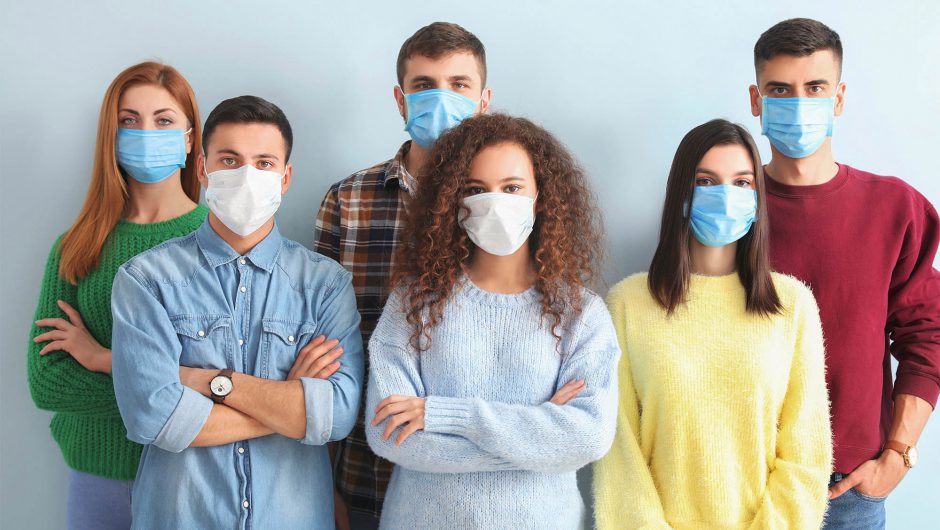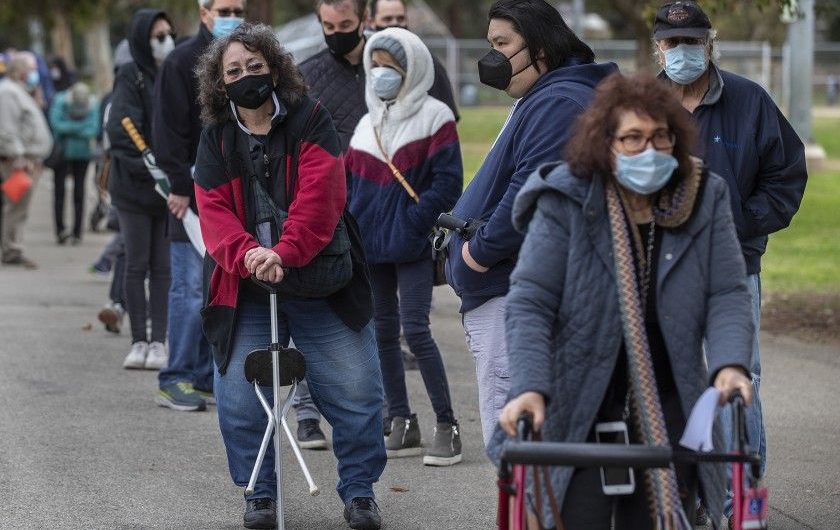[ad_1]
WASHINGTON — African-Americans and Latinos are vastly overrepresented when it comes to coronavirus infections, according to an analysis released by the Centers for Disease Control and Prevention on Monday morning.
The findings provide additional confirmation that, as the CDC’s own report says, black and brown communities have been “disproportionately affected” by the pandemic. African-Americans account for only 13.4 percent of the U.S. population, according to the Census Bureau, but the CDC says they accounted for 22 percent of coronavirus infections studied in the new analysis. (A little more than half of all coronavirus cases in the U.S. do not include racial data, making a complete picture of the pandemic’s racial outcomes effectively impossible.)
At a mobile COVID-19 testing station in Compton, Calif. (Robyn Beck/AFP via Getty Images)
Latinos represent 18.3 percent of the population, according to the last census of the American population, conducted a decade ago. But the CDC found that they suffered 33 percent of the coronavirus infections in the cohort covered by the study.
Native Americans account for 1.3 percent of infections across the nation, which is just slightly more than their share of the general population (1.2 percent). The coronavirus has affected the Navajo Nation, a reservation across three Southwestern states, with exceptional force.
White Americans accounted for 36 percent of coronavirus infections, while they make up 76.5 percent of the nation’s population (that figure includes Hispanic whites and drops to 60.4 percent if only non-Hispanic whites are included in the cohort; it is not clear how, exactly, whiteness was defined in the new CDC study). Asian-Americans, people of Hawaiian-Pacific Islander background and people who identified as biracial or multiracial represented much smaller shares of the infected population.
The new data, the first from the federal government to fully describe the pandemic’s racial impact, comes amid continuing protests against police killings of black men. Those protests have highlighted broader inequalities in American society, including those pertaining to how widely different communities can access proper health care.
Story continues
“The disproportionate impact that COVID-19 has had on people of color is staggering,” Sen. Kamala Harris, D.-Calif., told Yahoo News. Harris is the author of the COVID-19 Racial and Ethnic Disparities Task Force Act, which would focus federal attention on how race has factored into the nation’s response to the coronavirus, which has killed nearly 120,000 Americans.
Harris explained that poor health outcomes for people of color were “due in large part to disparities in access to health care, systemic barriers to affordable housing, and environmental injustice that existed long before the pandemic. The federal government must be proactive in righting these historical wrongs,” added the junior senator from California, who is also a potential Democratic vice presidential nominee.
Sen. Kamala Harris. (Carolyn Kaster/AP via Getty Images)
Former Vice President Joe Biden, whose prospects during the Democratic primary were bolstered by African-Americans in South Carolina and other states, has spoken in recent weeks more boldly than he has before on issues of racial justice. Writing recently on Medium, Biden said “structural racism” was to blame for the worse health outcomes experienced by people of color in the coronavirus pandemic. He deemed the situation “unconscionable” and, like Harris, called for better data to understand the scope of the problem.
Though health researchers and journalistic outlets have tried to address the lack of data, the CDC’s case surveillance study appears to be the most complete effort to address that shortfall. The report also discusses comorbidities that exacerbate the effect of the coronavirus, such as lung disease and diabetes. It also analyzes coronavirus infections by gender and age.
This trove of new information, including the racial breakdown, comes in the CDC’s Morbidity and Mortality Weekly Report, commonly used to address and bring attention to emerging matters of public health concern. The report released on Monday was titled “Coronavirus Disease 2019 Case Surveillance — United States, January 22–May 30, 2020.” The survey was conducted by Erin Stokes, a surveillance epidemiologist at the Atlanta-based public health agency.
Stokes and her co-author surveyed the 599,636 coronavirus cases between January 22 and May 30 for which racial data was available. Those cases represent only 45 percent of all coronavirus cases, as discrepancies in reporting mean that racial data were not always disclosed by laboratories or public health offices.
“There are a number of challenges that come up with capturing race and ethnicity data,” Stokes explained to Yahoo News in a telephone interview following her report’s publication. Some people are reluctant to provide such information, and some hospitals and clinics simply may not report it. She did note that she was seeing “really big improvements” in the breadth of data being shared with the CDC.
Among the provisions in the CARES Act, which provided a $2 trillion stimulus fund for small businesses, corporations and people who met income requirements, was a stipulation that laboratories conducting coronavirus tests report ethnic, racial and other data to the federal government. But a recent guidance from the Department of Health and Human Services says that such reporting does not have to begin until Aug. 1.
Adm. Brett Giroir, assistant secretary for health at the Department of Health and Human Services. (Tom Williams/CQ-Roll Call via Getty Images)
Testifying on Capitol Hill last week, the White House’s coronavirus testing czar, Adm. Brett Giroir, acknowledged the existence of racial disparities. He also said that trying to address those disparities without a complete picture of who was getting coronavirus tests was tantamount to “flying blind.”
“We can’t develop a national strategy to reach the underserved, or know how well we’re doing, till we have the data that shows us whether we’re reaching them or not,” Giroir said.
A spokesperson for the federal health department told Yahoo News that the agency has “made sure that the majority of federally associated community-based COVID-19 testing sites are located in sites of high social vulnerabilities, as well as relied on increasing testing at federally qualified health centers,” which the spokesperson said treat a total of 30 million people annually.
The spokesperson pointed out that the Office of Minority Health at the Department of Health and Human Service was investing $40 million to create a “strategic network of national, state, territorial, tribal and local organizations to deliver important COVID-19-related information to racial and ethnic minority, rural and socially vulnerable communities hardest hit by the pandemic.”
Critics say that such efforts should have been undertaken months if not years ago. In another congressional hearing, this one conducted before the House Ways and Means Committee last month, antiracism scholar Ibram X. Kendi described a “racial pandemic” in which the devastation of the coronavirus was compounded by racial prejudice and governmental indifference to communities of color.
Kendi has worked with the COVID Tracking Project, a data-collection initiative started by the Atlantic magazine, to create the COVID Racial Data Tracker. According to the data displayed there, the coronavirus has killed 24,427 people of African-American background.
The new CDC case surveillance data seems to confirm what was apparent to anyone who has watched the havoc wreaked by the coronavirus in African-American communities like the seventh and eighth wards of Washington, D.C., as well as the boroughs of Brooklyn and Queens in New York City. The coronavirus has also ravaged the Latino population in Chicago, as well as meatpacking plants across the Midwest, where many immigrants from Latin America work.
Rep. Adriano Espaillat, a Democrat who represents a heavily Latino section of upper Manhattan, told Yahoo News that “metabolic health disparities in the Hispanic community” only worsened the impact of the coronavirus. He said ailments like diabetes and asthma are especially prevalent in his district, which also includes parts of the Bronx.
Espaillat, a leader in the Congressional Hispanic Caucus, explained that the Trump administration’s restrictive immigration policies have made some of his constituents hesitant to cooperate with public health authorities because of deportation fears. He said that was especially the case with contact tracing, in which “disease detectives” try to figure out how a pathogen is spreading through a community. Epidemiologists believe contact tracing is critical to breaking the chain of disease transmission.
“I know many members of the Hispanic community in my district are in mixed-status multigenerational households,” Espaillat told Yahoo News. People living in such arrangements “may be reticent to share information with a public health worker or volunteer who in absolute earnest wants to help. It is incumbent on myself and other Hispanic leaders to communicate that these tracing efforts are part of a larger public health intervention and assuage the fears that this information may be used in some way to harm or break up a family.”
For many elected officials in Washington who represent communities of color, the new CDC study only confirms what they have known for months. Rep. Karen Bass, D-Calif., who chairs the Congressional Black Caucus, told Yahoo News that, in her view, it was “absolutely shameful” that black and brown communities were bearing the brunt of the pandemic. She added that the CDC’s statistics put “health disparities in this country on full display.”
Bass called for “concentrated testing in communities that are being disproportionately impacted by this pandemic.”
Some communities have decided not to wait for the federal government’s help. African-American churches in Dallas set up test sites of their own, and the Bilingual Christian Church in Baltimore, which caters to a Latino population, offered coronavirus testing earlier this week. Echoing the concerns voiced by Espaillat, the church’s pastor promised that nobody who came in for a coronavirus test would be reported to immigration authorities.
_____
Read more from Yahoo News:
[ad_2]
Source link



